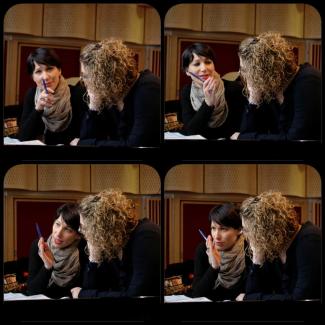Vocal Coaching
In this fragment taken from my public Masterclass, held on the occasion of the course at the Academy of the Aix en Provence Festival in 2018, I illustrate how Wolfgang Amadeus Mozart uses musical tonalities with a precise expressive intent.
In this speech I explain (in French) what is the precious role of the Maestro di Sala or Répétiteur. Not only musically building the role of the singer but also supporting him in all the evolutions, challenges and problems he may encounter during the preparation of a performance.
After the fun (but very useful) experiment of the parts sung in the mother tongues of each individual singer, now let's move on to the original language!
Style, rhythm, phrasing. But also passion and energy. They are fundamental components for a good execution and interpretation. The task of the singers is therefore the rigorous study, fundamental to deepen and acquire all these characteristics. You have to be very smart to do it!
"Ti deggio abbandonar", three key words that express the feelings of the characters and the situation.
The quintet from the "Cosi fan tutte", an absolute masterpiece of contrasts between melodic and rhythmic themes distributed in the various voices, unlike the sentiment that the protagonists are expressing.
The beginning of the second act of Wolfgang Amadeus Mozart's Don Giovanni is a brilliant and energetic exchange between Don Giovanni and Leporello. The music supports a duet with a strong character but full of Mozartian grace.
Some suggestions also for those who are starting the splendid career as a Maestro di Sala or Repetiteur.
In working with young singers I often use small "tricks" that can help to get a good result in a faster and more effective way.
A formidable technique for grasping the meaning of the words that are being sung: reciting them rhythmically. It is a technique that I often use in my work especially in Mozart's music.
How to find the right rhythm, the right intention and the correct diction in a difficult passage from Mozart's Don Giovanni. Don Giovanni and Leporello grappling with the duet in the first scene of the second act.
Vocal Coaching
Roberta, how your journey began to become a coveted "Repetiteur"
My great fortune was to have found in my studies a wonderful teacher, Adalberto Tonini, who was my opera teacher and aroused in me the passion and enthusiasm for it. Son of art, his father Antonio was coach of Maria Callas and collaborated, in the golden years, as an accompanying pianist with the Teatro alla Scala.
Did the Teatro alla Scala play an important role?
At La Scala I came into contact with our tradition at a very young age, learning the correct performance practice of the Italian romantic opera; having a particular passion for the classical style, I deepened the repertoire, trying to get a mastery and a knowledge of the executive style of the works of the 700, especially the Mozart works.
Is Mozart one of your passions?
I love Mozart and I have a lot of fun performing and deepening his works. And this is how I was called to collaborate with the most important Mozart Festival in the world, the Aix en Provence Festival. In this context I have had the opportunity to work, as a chef de chant, with artists of the caliber of Natalie Dessay, Pietro Spagnoli, Alessandro Corbelli, Olga Peretyatko, Lawrence Brownlee, Ludovic Tezier and many other great names.
The European Mozart Academy also appears in your curriculum.
Yes, I was invited to teach at the European Mozart Academy of the Festival itself, where I worked with extraordinary students on the Mozart repertoire, focusing the study particularly on diction and intonation but also on the interpretation and execution of the style in the most correct way possible.
Vocal Coaching: in a nutshell?
All this experience, giving me great satisfaction, stimulated in me the desire, for the future, to go to teaching and work with young people. I love working with guys, no other job excites me more! The ability to internalize and implement, metabolize any advice is incredibly stimulating and exciting. I strongly believe in the new generations, they are special and they are the only real great, indeed great, resource of our world.
And it is on these new generations that we must invest our knowledge and communicate important values.
And music can undoubtedly contribute to a better world!











